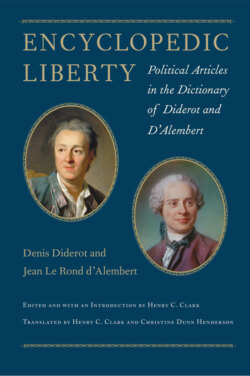Читать книгу Encyclopedic Liberty - Jean Le Rond d'Alembert - Страница 16
На сайте Литреса книга снята с продажи.
Оглавление[print edition page 2]
[print edition page 3]
The Divine Voice †
(Aius-Locutius)
*AIUS-LOCUTIUS, God of speech, whom the Romans honored by this extraordinary name. As it is also necessary to hold one’s tongue, they also had the god of silence. When the Gauls were about to invade Italy, a voice coming from the wood of Vesta was heard to cry out: “If you do not raise the walls of the city, it will be taken.” This advice was disregarded. The Gauls arrived and Rome was taken. After their retreat, the oracle was recalled and an altar was raised for him under the name that we are discussing. A temple was then constructed in Rome at the very place where he had made himself heard for the first time. Cicero says in the second volume of his study On Divination that this god spoke when he was not known by anyone but kept quiet the moment he had a temple and altars. The god of speech became mute as soon as he was worshiped.1 It is difficult to reconcile the singular veneration that the pagans had for their gods with the patience that they also had for the discourses of certain philosophers. Did the Christians whom they persecuted so much say anything stronger than we can read in Cicero? The books On Divination are merely irreligious treatises. But what an impression must have been made on the people by certain pieces of oratory in which the gods were constantly invoked and called forth to witness events, in which Olympian threats were recalled to mind—in short, where the very existence of the pagan deities was presupposed by orators who
[print edition page 4]
had written a host of philosophical essays treating the gods and religion as mere fables! Can we not find the solution to all these difficulties in the scarcity of manuscripts in ancient times? In those days the people hardly read: they heard the discourses of their orators and these discourses were always filled with piety toward the gods, but they were ignorant of what the orator thought and wrote about them in the privacy of his own house. These works were available only to his friends. Since it will always be impossible to prevent men from thinking and writing, would it not be desirable to allow them to live among us as they did among the ancients? The works of incredulity are not to be feared, for they only affect the masses and the faith of simple people. Those who really think know what to believe; and a pamphlet will certainly not lead them off a path which they have carefully chosen and follow by preference. It is not by trivial and absurd reasoning that a philosopher can be persuaded to abandon his God. Impiety is therefore not to be feared except for those who let themselves be guided. But a way to reconcile the respect we owe to the faith of the masses and to public worship with freedom of thought, which is extremely desirable for the discovery of truth, and with public harmony and peace without which there cannot exist any happiness for either the philosopher or the people, would be to forbid all the works against the government and religion that are in the vernacular, to allow those people to publish who write in a scholarly language, and to prosecute only the translators thereof. It seems to me that if we deal with the situation in this way, the nonsense that is written by certain authors will not harm anyone. Moreover, this arrangement will permit the greatest amount of freedom that can be granted in an orderly society. Wherever this privilege is not enjoyed in a similar manner, the country will still be properly governed. But corruption will certainly exist in a society where this freedom becomes more extensive. This is the case, I believe, of the English and the Dutch: it seems that the people in these countries think that they are not free unless they can be unrestrained and write with impunity. [The following sentence is an erratum that Diderot placed in volume 3 of the Encyclopedia.] If what we say in this article does not appear to be true and offends people, although this was not our intention, then we refer them to the article CASUIST where our thoughts are explained in a manner that should satisfy everyone.
